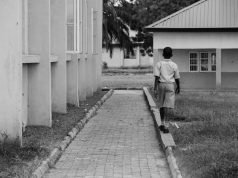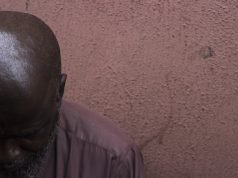by TONI KAN
NOBODY saw them arrive.
But believe me when I say that everyone knew when they left; none of us on that street will forget even if we lived to be hundred.
They were two of them, young boys on the cusps of manhood. Nineteen, twenty, twenty one. Who knew and who really cared. They were strangers, not one of us, so, at first, nobody poked their nose into their business.
All we knew is that we woke up one morning and they were there; a tall, thin one and a fat round one. Sam and Silas they said their names were.
They just appeared, as if out of nowhere and occupied that house, the uncompleted one, right next to the shoe maker’s.
No one had lived there for years since the family went to court after their father died. They cleaned out one room, and occupied it. No one asked questions. In many ways, it seemed as if we welcomed warmth in that house, as if the flicker of the candle they lit at night sent a warm glow right down the street. Gloom must have made us sentimental.
They didn’t go to work like we did. In the mornings they would walk down the street, washing cars that had been parked outside their compounds. Grateful owners dropped Naira notes in appreciation and sometimes if they saw a woman walking home laden with shopping, they would run after her and offer a hand in exchange for a tip, a fruit, a loaf of bread, something earned.
Three months ago, when the lawyer moved into your former flat, they helped wash it down. They helped paint it and they helped him reconnect loose wires. Those two, Sam and Silas, there was nothing they couldn’t do.
Where did they come from, you ask again? No one knew. I tell you, we woke up one morning and they were there; a tall thin one and a fat round one. Sam and Silas they said their names were.
They didn’t seem to ever leave that street in the 8 months they were with us. I saw them every morning, when I stepped out on the balcony for my morning smoke, washing a car or sitting out on the steps that led into the house they occupied and sunning themselves like well-fed lizards.
— Good morning bros, they would call and I would wave.
Sometimes, the thin one, the more friendly and loquacious one would put two fingers to his lips and send out imaginary smoke rings. It was his way of bumming a cigarette off me.
If I was in a good mood or had a full pack, I would signal to him and he would come over and receive two sticks for himself and his friend. Most times I just ignored him and he would smile and hail me.
— The Big Bros!
They washed my car too. At first, on days when I came back too late and too drunk to manoeuvre into my spot in the compound but in time they took to coming into the compounds to wash the cars especially for those of us who didn’t have drivers or security men to do it for us.
Did anyone mind? No. We did not mind. Why should we. They were happy to get a hundred Naira, two hundred Naira, and we were happy to give it; one tenth of what we would pay at the car wash.
And they could wash cars, those boys.
— We dey mix Omo with kerosene.
Sam the thin, tall one told me when I commended them one morning.
— Na the combinate dey make am shine, he explained.
The combinate, I muttered under my breath as I fished out a two hundred Naira note.
— The Big Bros, he hailed as he picked up his bucket, his plump friend waddling out behind him.
The fat one was always silent and always reading.
What did he read? I don’t know. I never bothered to check but he always had a book or something; some tattered paperback or heavy tome, filched out of some dump or bought second hand apparently.
They were strangers and strangers have strange ways. That was what everyone thought and said. But did it stop us from sending them on errands? No. Neither did it stop us from watching them dig and shovel out dirt from our gutters on the last Saturday of every month when the whole street turned out for the monthly environmental sanitation exercise.
We would all stand or sit, reading newspapers and talking politics, Baba Mercy’s voice echoing, while the two boys, dug and shovelled, raking out muck and grime.
And when they were done, we would say well done, well done and scurry off into our compounds.
They were hard workers those boys. Nothing was too tough or too menial.
Last month, just before what happened happened, they even joined the masons when Baba Mercy decided to complete roofing and plastering the house he abandoned after his daughter died.
I watched them work, hefting bags of cement onto strong shoulders and then running up the scaffold with pans laden with concrete as if it was cotton fluff. There was something about them, the rippling muscles under taut skin for Sam and the folds of flesh that wobbled on Silas, that spoke of purpose and youth and something indiscernible.
Many of us wanted our brothers who lived with us to be like them. We wanted our siblings to work, to have purpose, to be engaged instead of sitting all day at home watching cable TV, playing computer games and chasing after the girls like dogs.
Did any girls visit them? Of course! People talked, said they were munching through the house girls on the streets like soft bread. Especially that Sam. He had a mouth on him. It was easy for him to charm the pants and ragged wrappers off the house helps. I used to see him at work. He was a maestro, reminded me all the time of you back then in school, when you were king, before you found Christ or was it the other way round?
I should leave Christ alone. Is that how you are going to save my soul? Ok, I have left him alone.
Sam had a quick retort for everything and he laughed like he owned the street. The laughter is what I remember the most because it was silent later that day. His laughter was loud, happy, care-free like a rumble of thunder rolling through the heavens.
You remember what you told me back then at Jos, in school; that to get a babe you must abandon shame. That was Sam. The way he went at the girls, you could see that this was a man in whose vocabulary the word shame did not exist.
Soon, some of the street girls began to get curious. We heard things too. There were warnings. The boys who lived on the street, who did not want to see these strangers dip their fingers into their pots sent out warnings. They accosted Sam and Silas in their den at night. Warnings were issued. Slaps were exchanged. Threats were made.
Sam and Silas withdrew. They still washed cars, they still helped women laden with shopping, they still raked out grime from our gutters but now they did it in slow motion. They had been told who they were, what they were, strangers! They didn’t belong. They were there because we allowed them. They would do well to stand on one foot, play the cock on new territory, to not get too familiar.
But it did not last. Two days, three days, one week, they were back to their jolly selves. Sam’s laughter cleaved the air, waking up the somnolent afternoons. They re-joined the street boys where they played football at the corner. They bummed cigarettes off those of us who smoked. They danced on the streets, winked at the girls and lived. They were boys after all and that was what boys did. Boys think they are invincible, that they are above it all. They think they can stare death in the face and laugh it to scorn.
We accepted them again, but still like we had before, as strangers, still with suspicion in our eyes, always with unspoken questions; where did they come from, what did they want.
The balance of things seemed restored and we saw them and yet did not see them. They were Sam and Silas, the thin one and the fat one and then something happened.
To read more, download the prequel to the History Issue.
































[…] Read the excerpt from Toni Kan’s Strangers […]
guy finish story na…i no fit download am jare..oya gimme blog site make i read
Comments are closed.